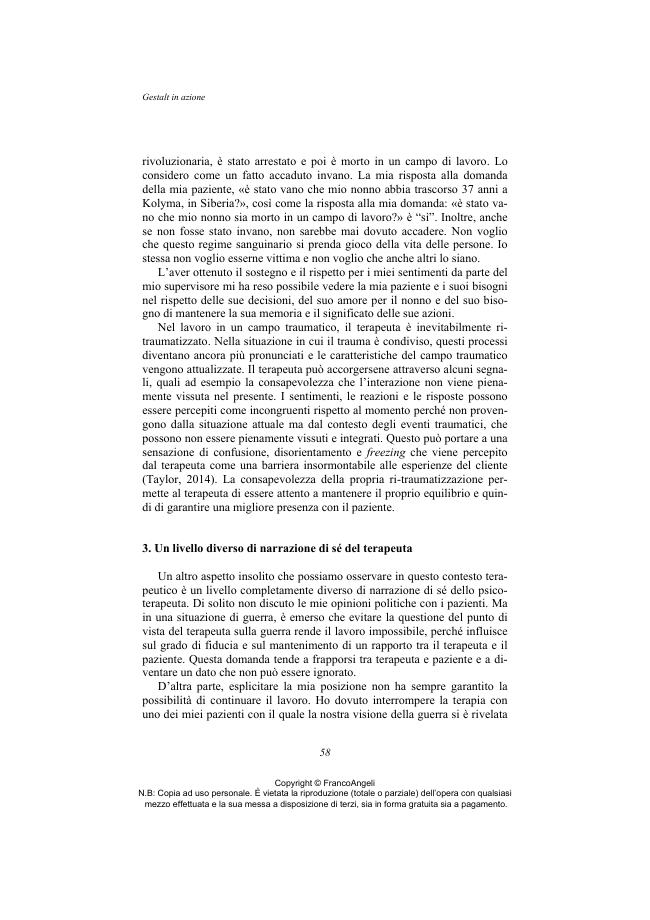Nuove prospettive del lavoro terapeutico in tempo di guerra : il campo traumatizzato
P. 53-63
Quando un paziente entra in uno studio di psicoterapia porta con sé la propria esperienza traumatica, e alcuni aspetti entrano inevitabilmente in risonanza con l'esperienza traumatica del terapeuta. La situazione diventa ancora più difficile per il terapeuta se l'evento traumatico è globale e condiviso da entrambi, come in situazioni di guerra, disastri politici o naturali. In questo caso è molto importante comprendere i limiti del terapeuta. Il tentativo del terapeuta di evitare la ritraumatizzazione porta alla repressione di una parte della sua personalità e, di conseguenza, a una diminuzione della sua presenza nel contatto con il paziente, alimentando i campi traumatici e rafforzando la disconnessione. Per poter stare con l'altro, è necessario mantenere il proprio equilibrio e continuare a trova-re risorse per lavorare nel campo traumatico. [Testo dell'editore]
The author describes how her experience as a psychotherapist changed during the Russian-Ukrainian War. Having been born and raised in Russia and having, like many Russian therapists, friendly and professional ties with Ukrainian colleagues, she experienced significant personal repercussions. When a patient enters the therapist's study, he/she brings with him/her his own traumatic experience, and some aspects inevitably resonate with the therapist's traumatic experience. The situation becomes even more difficult for the therapist if the traumatic event is global, shared by therapist and patient, for example in situations such as war, political or natural disasters. This is what happened after February 24, 2022.
In the article, the author shares her view on the change she has experienced in the therapeutic setting since the beginning of the war: for example, the power of transgenerationalreactions, a different level of self-narration of the therapist, the violation of borders and theinterweaving of contexts. It is very important that the therapist is aware of his/her own traumatization and that he understands his own limitations. If the attempt to avoid retraumatization leads to the repression of part of his personality and, consequently, to a decrease in his presence in contact with the patient, this feeds the traumatic fields, strengthening the disconnection [Publisher's text]
-
Articoli dello stesso fascicolo (disponibili singolarmente)
-
Informazioni
Codice DOI: 10.3280/GEST2022-002004
ISSN: 2035-6994
MATERIE
PAROLE CHIAVE
- Campo traumatico, psicoterapia della Gestalt durante la guerra, ritraumatizzazione del terapeuta, trauma transgenerazionale, supervisione
- Traumatic field, Gestalt therapy during the war, therapist's r-traumatization, transgenerational trauma, supervision



